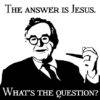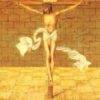Tag: Theological
God’s Freedom, Goodness and Necessity in Philosophical and Theological Convivium
More thoughts on the properties of God for my philosophy of religion class. As I have been responding, this week, surrounding God’s omniscience, eternality freedom, goodness, and necessity. These are my last three responses. What is freedom? Does it make sense to talk about maximal or perfect freedom? If yes, how should this be defined? If not, why not? Do you agree that the ability to do what is morally wrong is a power for human beings but a liability for God? Answer the question by laying out the argument for this as you understand it, or asking any questions…
The Answer is Jesus: John 3:16 in its Theological Depth Dimension
I take this to be something of a paraphrase of John 3:16 by Karl Barth (even though he doesn’t identify it as such, explicitly): Basically, the doctrine of the concursus [trans. accompanying] must be as follows. God, the only true God, so loved the world in His election of grace that in fulfilment of the covenant of grace instituted at the creation He willed to become a creature, and did in fact become a creature, in order to be its Saviour. And this same God accepts the creature even apart from the history of the covenant and its fulfilment. He…
A Critical Theological Anthropology vis-à-vis a Knowledge of God against a Turn to the Subject
I put together the following some time ago, and only had it saved as a draft here on the blog. I thought I would publish it now. I actually don’t even recall who my interlocutor is anymore; maybe he’ll see this and remind me. I shared the following passage on Facebook and X, from John Baillie, as cited by TF Torrance in his book: Theological Science. The fact is that no true knowledge, no valid act of perceiving or thinking, can be explained by beginning from the human end—whether it be my perception of the number of peas in a…
Theological Academia Juxtaposed with a Theology of the Crucis
I think a lot of people involved in theological academics are driven by a competitiveness equal to professional athletes. There is this desire to over-excel in such a way that they out produce, or equally produce, by way of quantity and quality, with reference to their academic publishing (and other accolades). A constant need to prove to themselves, and others, that they are at the top of the game, and have achieved where most others have failed (or not even aspired to). The irony of this type of drivenness is that it is antithetical to a theology of the cross….
The Theological and Ideational History Behind the Deconstructed Culture Writ Large
In those days there was no king in Israel; everyone did what was right in his own eyes. –Judges 21:25 The human heart has never changed. Ironically, in our secular times humanity, in the main, has come to believe that we have “progressed” beyond our primitive forebears. Secular humanity of the 21st century generally maintains that it has moved beyond the religious platitudes and superstitions of the pre-critical past, and moved onto greener and more enlightened pastures. But the secular age, in fact, is really just a mythology that needs to be demythologized by the lights of sound and theological…
Theological Science, au contraire to the Natural Theology of the Schoolmen
The following is a highly overlooked point, particularly with reference to Christian theology. What, or more pointedly, Who is theology’s control? The answer to this question drives what I attempt to be all about, when it comes to doing prayerful and dialogical theology. We could ask this question another way: is there an order, a taxis, to doing Christian theology; an order that takes into account a thoughtful and intentional theological ontology? These are important questions, and ones that I rarely see engaged with within the received theologies of much of evangelical Lutheran and Reformed theologies. It is just presupposed…
A first-of-its-kind education for Indigenous leaders: Theological Education for Indigenous Leaders program launches
The following is cross-posted from Living Lutheran. The original post can be found here. The inaugural cohort of Pacific Lutheran Theological Seminary’s (PLTS) Theological Education for Indigenous Leaders (TEIL) launched on Oct. 9 with an opening ceremony and shared celebration attended by leaders from across the ELCA. Photos: Courtesy of Pacific Lutheran Theological Seminary Larry Thiele, a pastor in the Eastern North Dakota Synod, teaches a TEIL course as one of the program’s wisdom keepers. Some of the Indigenous leaders and wisdom keepers of the TEIL program with Moses Paul Peter Penumaka, director of Theological Education for Emerging Ministries (far…
A Very Theological Proposal: Gratitude as the Ground for What it Means to be Human, Coram Deo
“What is man that thou are mindful of him . . . ?” King David, as he stood before the grandeur of God, as He reflected upon God’s handiwork in creation, asked an age-old question, with reference to the who of humanity. In this instance, he wasn’t necessarily attempting to peer into the entailments of a theological anthropology, but instead simply standing in awe at the bigness of God relative to God’s compassion for us small little human beings here on the flatland. For the rest of this piece, I want to think about what it means to be human…
Vine Deloria Jr. Theological Symposium
Vine Deloria Jr. Theological Symposium In 2013 the annual American Indian and Alaska Native Symposium at the Lutheran School of Theology at Chicago was renamed in honor of Vine Deloria Jr., an alum of Augustana Seminary, Rock Island, Ill., a predecessor school of LSTC. The symposium has been held in November each year since it began 15 years ago and is co-sponsored by the Pero Center for Intersectionality Studies at LSTC and the ELCA’s Indigenous Ministries and Tribal Relations. All events will be accessible online, and the theme is tribal sovereignty. At the height of the American Indian Movement and beyond,…
ALL Interpreters of the Bible Are Theological Interpreters
Let me say another word about theological exegesis (I prefer that to theological interpretation of Scripture, as far as the language goes). I’m not sure I made myself as clear as I would like to have in my last post: everyone and anyone who attempts to interpret the Bible does so “theologically.” I don’t think this is appreciated enough, at all! In order for folks to appreciate this properly they might have to reorientate their thinking a bit. No matter what belief system, or belief reality someone is committed to, they bring this to the text of Scripture. So, if…





